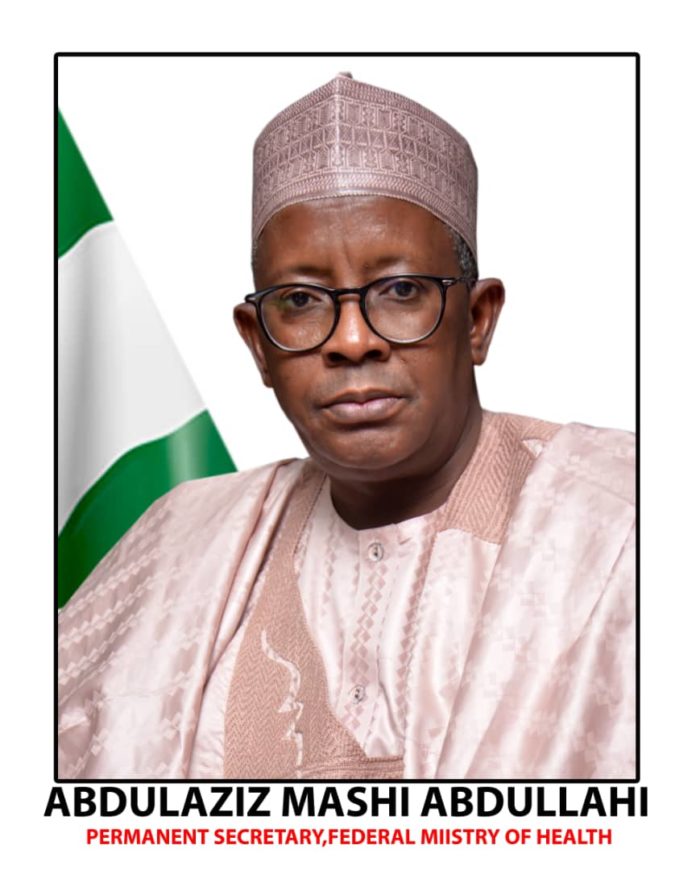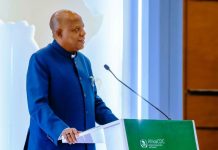The Permanent Secretary, Federal Ministry of Health, Abdulaziz Mashi Abdullahi in describing the Sickle Cell Disease (SCD) as “the most frequent and the most common genetic disease worldwide”, has said that the theme of “Shine the Light on SCD” for the 2020 World Sickle Cell day is apt not only in creating awareness on important issues related to elimination of negative notions associated with SCD, but also apt for building synergy with Civil Society Organizations (CSOs) , international organizations and development partners towards the prevention, control and management of SCD in Nigeria by the Government.”
The 2020 World Sickle Cell Day was scheduled to be marked 19th of June, 2020.
The Permanent Secretary also said that despite the COVID-19 pandemic, “We must remain focused on this SCD disease which he described as “of immense public health importance in our country”. He charged that we must identify those affected early and “institute appropriate interventions, work towards reducing stigmatization of those affected, reduce its transmission, improve the quality of life of those living with the disease through quality care and scale up on the awareness creation and reduce disinformation about the disease in our country.”
The SCD found mainly on four continents: sub-Saharan Africa, in Asia (Middle-East, Arabic peninsula, India), in the Americas and in Southern Europe is a generic name for a group of inherited haemoglobin disorders characterized by the presence of sickle red cells in the blood which leads to clinical illness.
The disease affects nearly 100 million people around the word and it is estimated that 500,000 children are born every year with this severe and invalidating condition and 50% of those born with the disease will die before the age of 5 years.
It is the most prevalent genetic disease in the WHO Afro Region. In many countries of the region which include Nigeria, 10% – 40% of the population carries the sickle-cell gene resulting in estimated SCD prevalence of at least 2%.
Nigeria has about 25% of her adult population carrying the defective Sickle gene in a carrier state and WHO in 2015 estimated that 2% of all new-borns in Nigeria are affected by sickle cell disease, giving a total of about 150,000 affected children born every year. About 50% – 80% of the estimated 150,000 infants born yearly with SCD in Nigeria die before the age of five years and those that manage to survive suffer end-organs damage which shortens their lifespan including stroke.
The United Nations Organization (UNO) had recognised and declared SCD as a disease of public health importance on 22nd December, 2008 and as one of the top non-communicable diseases (NCDs) significantly contributing to maternal, neonatal, infant and child disability, morbidity and mortality. This disorder may negatively undermine the attainment of Sustainable Development Goals (SDGs) 1, 3 and 4.
Having recognized the huge burden of SCD in Nigeria and the big threat it poses to socio-economic development of the country, the Government of Nigeria over the years instituted several strategic interventions to address the challenges of the disease through the FMOH.
These strategic interventions include:
- Six centres of excellence for the control and management of SCD were established across Nigeria one in each geo-political zone with each equipped with HPLC and other complementary equipment and staff to serve as a hub for newborn screening.
- National guidelines for the prevention, control and management of SCD including the national policy and protocol for universal newborn screening in Nigeria were produced. E-copies are available online.
- Integration of the NCDs including SCD care and services into the primary healthcare services was initiated. This is an ongoing initiative.
- Draft Nigeria-PEN adapted from WHO-PEN included SCD for Nigeria taking into account the genetic counselling, diagnosis, newborn screening and comprehensive care package for SCD within the primary healthcare level with inbuilt cost-effective referral system.
- Advocacy and mass mobilization for awareness creation on SCD and the importance of genetic counselling and testing for Hb genotype commenced in some parts of the country. This is an ongoing initiative.
- SCD Patient Support Groups was established and this group has transformed into the Sickle Cell Support Society of Nigeria. These groups have annual scientific meetings and works with government in her efforts to address the burden of the disease in the country.
- We are expanding our National Programme on Immunization to include Pneumococcal vaccines. This we believe would increase access to early interventions for survival of our newborn with the disease. Federal Government has also reviewed the licensing of Niprisan, an anti-sickling agent in the country.
The Permanent Secretary, Federal Ministry of Health, Abdulaziz Mashi Abdullahi went on to identify the main priorities for Federal Government on SCD control as follows:
“Nigeria’s main priorities in addressing the challenge of SCD include: Primary prevention; Repositioning of the SCD centres; Capacity building; Integration of SCD care and services into the maternal and child health services especially at the primary and secondary levels of healthcare in Nigeria; establishing a data registry for SCD for the country; enhancing sickle cell disease surveillance; scaling up of advocacy and mass mobilization of communities for SCD across Nigeria including continuous advocacy for access to drugs and diagnostics including local production of Hydroxyurea for SCD and mass mobilization for support for the newborn screening policy.
Other priorities identified by the Permanent Secretary, Health, include “Strengthening supportive supervision; Monitoring and evaluation for SCD interventions and activities; and Improving and coordinating SCD research activities in the country.”
Abdullahi extended the assurance of the Federal Ministry of Health that “though Nigeria has the highest burden of SCD in the world, all efforts are being made to reduce the burden through appropriate preventive measures.” He admonished that “We must all therefore make concerted efforts in knowing our genotype and key into this Initiative so that together we can halt this epidemic of SCD in our country.” He said: “Government is aware that some health groups dedicated to SCD treatment or support hold special educational celebrations on a day like this, however, even if we can’t gather for such and you cannot attend one as a result of the current pandemic, why not spend this day researching the illness, learning about the signs and symptoms and increasing your understanding of its global impact?”
Signed
Olujimi Oyetomi, Director, Information, Media & Public Relations,
Federal Ministry of Health.






